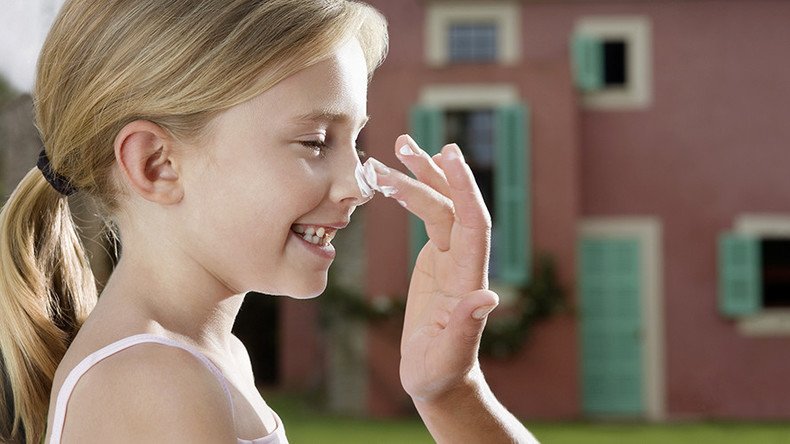States consider allowing kids to use sunscreen at school without doctor’s note

Lawmakers in several states have passed legislation granting children permission to possess and use sunscreen at school, which has been regulated by schools since the FDA declared it to be an “over-the-counter” medication.
Since the US Food and Drug Administration (FDA) declared sunscreen to be an “over-the-counter” medication in 2011, most states have banned students from bringing it to school without a note from a doctor, and even then, they usually require the student to visit the nurse before they can use it.
In 2002, California became the first state to pass legislation allowing learners to bring sunscreen to school without a doctor's note. The bill also allowed children to wear a hat when outdoors, which most schools forbid, citing their connection to gangs.
In March, Utah Governor Gary Herbert (R) signed a similar bill introduced by Utah Rep. Craig Hall (R-33), who said the law would prevent serious sunburns at school.
“If you just Google ‘kid sunburned at school, some of the stories are horrifying,” Hall said, according to USA Today.
In Arizona, Rep. Heather Carter (R-15) said legislation she introduced had “an outpouring of support from providers and parents.”
“I really haven’t heard anyone that is opposing the bill,” Carter said, according to Cronkite News, the news division of Arizona PBS. “This is common-sense legislation that is extremely important in Arizona given our climate and exposure to sun.”
In Rhode Island, legislation sponsored by Rep. David Bennett (D-20) ran into opposition from the state association of school nurses, which said that sunscreen should be kept out of classrooms because some students have sunscreen allergies.
Diane Kowal, president of the Rhode Island Certified School Nurse Teachers Association, said that two children in her district have such strong allergies that they have to carry EpiPens.
“We’re not against sunscreen," Kowal said, according to USA Today. “There just needs to be language to protect everyone, from the person putting it on to the kids sharing it.”
Congrats to the @RIHouseofReps for passing H 5167 - allowing students to possess and use sunscreen! #SUNucatehttps://t.co/eSOp8tAff6
— ASDSA (@ASDSAdvocacy) May 10, 2017
The American Society for Dermatologic Surgery (ASDS) has applauded lawmakers for passing the recent bills, which they have been lobbying for in their “SUNucate” campaign.
In March, members of ASDS drafted model legislation and set aside $30,000 in grants for state dermatology organizations to lobby for the bill.
“SUNucate has achieved great success and media attention in the last few months,” Thomas Rohrer, ASDS president said in a statement. “These achievements will help educate the public on skin cancer prevention and the real risks associated with too much exposure to harmful UV rays.”
In total, seven states have passed similar measures this year, including Alabama, Arizona, Florida, Louisiana, Ohio, Utah and Washington.
On Tuesday, lawmakers in Massachusetts will hold a hearing on such a bill.
Tomorrow #Massachusetts lawmakers hold hearing on bill to allow #sunscreen in school. We urge support for this bill! https://t.co/9hnI34C0MH
— MelanomaResearchFdn (@CureMelanoma) July 17, 2017
Legislation was also introduced in Mississippi, but it did not pass through a House committee.
“Parents, I think, are the best decision-makers on” Senator Terry Burton (R-Mississippi), a co-sponsor of the bill, said, according to USA Today. “The school should not interfere with that decision that a parent makes to protect their child.”












